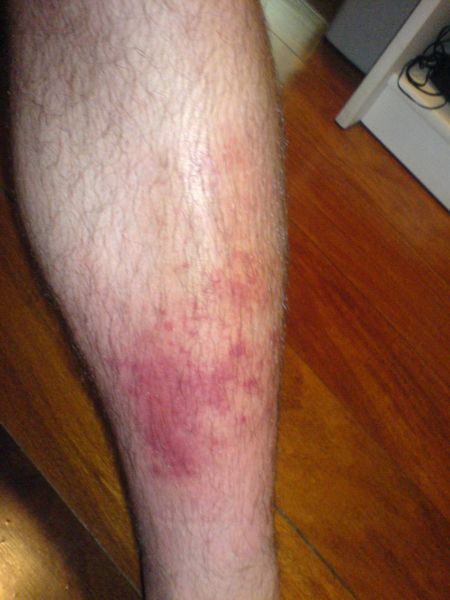Cellulitis: Difference between revisions
| Line 42: | Line 42: | ||
==Treatment== | ==Treatment== | ||
[[Cellulitis medical therapy|Medical therapy]] | [[Cellulitis surgery|Surgical options]] | [[Cellulitis primary prevention|Primary prevention]] | [[Cellulitis secondary prevention|Secondary prevention]] | [[Cellulitis cost-effectiveness of therapy|Financial costs]] | [[Cellulitis future or investigational therapies|Future therapies]] | [[Cellulitis medical therapy|Medical therapy]] | [[Cellulitis surgery|Surgical options]] | [[Cellulitis primary prevention|Primary prevention]] | [[Cellulitis secondary prevention|Secondary prevention]] | [[Cellulitis cost-effectiveness of therapy|Financial costs]] | [[Cellulitis future or investigational therapies|Future therapies]] | ||
==Diagnosis== | ==Diagnosis== | ||
Revision as of 14:22, 27 January 2012
For patient information click here
| Cellulitis | |
 | |
|---|---|
| Infected left shin | |
| ICD-10 | L03 |
| ICD-9 | 682.9 |
| DiseasesDB | 29806 |
| MeSH | D002481 |
|
Cellulitis Microchapters |
|
Diagnosis |
|---|
|
Treatment |
|
Case Studies |
|
Cellulitis On the Web |
|
American Roentgen Ray Society Images of Cellulitis |
Editor-In-Chief: C. Michael Gibson, M.S., M.D. [1]
Overview
Historical Perspective
Pathophysiology
Epidemiology & Demographics
Risk Factors
Screening
Causes
Differentiating Cellulitis
Complications & Prognosis
Diagnosis
History and Symptoms | Physical Examination | Staging | Laboratory tests | Electrocardiogram | X Rays | CT | MRI Echocardiography or Ultrasound | Other images | Alternative diagnostics
Treatment
Medical therapy | Surgical options | Primary prevention | Secondary prevention | Financial costs | Future therapies
Diagnosis
Cellulitis is most often a clinical diagnosis, and local cultures do not always identify the causative organism. Blood cultures usually are positive only if the patient develops generalised sepsis. Conditions that may resemble cellulitis include deep vein thrombosis, which can be diagnosed with a compression leg ultrasound, and stasis dermatitis, which is inflammation of the skin from poor blood flow.
Incubation
Cellulitis can develop in as little as twenty-four hours or can take days to develop.
Duration
In many cases, cellulitis takes less than a week to disappear with antibiotic therapy. However, it can take months to resolve completely in more serious cases, and can result in severe debility or even death if untreated. If it is not properly cured it may appear to improve but can resurface again even after months and years.
Treatment
Antibiotics - typically a combination of intravenous and oral antibiotics are administered. Bed rest and elevation of affected limbs is also recommended. Drink plenty of fluids as well - at least 8 glasses of water a day.
Prevention
Good hygiene and good wound care lower the risk of cellulitis. Any wounds should be cleaned and dressed appropriately. Changing bandages daily or when they become wet or dirty will reduce the risk of contracting cellulitis. Medical advice should be sought for any wounds which are deep, dirty or if there is concern about retained foreign bodies.
Cellulitis in horses
Horses may acquire cellulitis, usually secondary to wound (which can be extremely small and superficial) or to a deep-tissue infection, such as an abscess or infected bone, tendon sheath, or joint. Cellulitis from a superficial wound will usually create less lameness (grade 1-2 out of 5) than that caused by septic arthritis (grade 4-5 lameness). The horse will exhibit inflammatory edema, producing a hot, painful swelling. this swelling differs from stocking up in that the horse will not display symmetrical swelling in 2 or four legs, but only in one leg.
This swelling begins near the source of infection, but will eventually continue downward the leg. In some cases, the swelling will also travel upward. Treatment includes cleaning the wound and caring for it properly, the administration of NSAIDs, such as phenylbutazone, cold hosing, applying a sweat wrap or a poultice, and mild exercise. Veterinarians may also perscribe antibiotics. Recovery is usually quick and the prognosis is very good if the cellulitis is secondary to skin infection.
Additional resources
- King, Christine, BVSc, MACVSc, and Mansmann, Richard, VDM, PhD. "Equine Lameness." Equine Research, Inc. 1997. Pages 548-549.
- MFMER. 'Cellulitis'. 3 July 2002. Mayo Foundation for Medical Education and Research. 30 Oct. 2003 [2].
- NLM. 'Group A streptococcal infections'. 2002. National Library of Medicine. 30 Oct. 2003 > .
- Pankey, George A. "Approach to rashes and infections of the skin and subcutaneous tissues." Textbook of internal medicine. 2nd ed. 2 vols. Philadelphia: J. B. Lippincott Company, 1992.
- Cellulitis Overview (with picture).